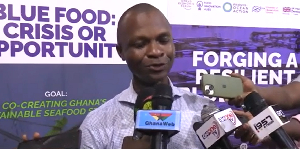A Tamale-based contractor, ex-Sgt. Karim Salifu Adam, who was arrested and charged for allegedly plotting to violently overthrow the government in 1994 has been freed.
Adam was set free after the Attorney General filed an application of the government's disinterest to continue with the prosecution at an Accra High Court.
The "nolly prosequi" application does not, however, mean that the case cannot be brought up again if fresh evidence is found to incriminate him. Adam has therefore been discharged but not acquitted.
Ordering the freeing of Adam who was in jail for seven years without bail on Monday, July 30,2001, an Accra High Court presided by Justice Apaloo directed that Adam shall not be charged again on the same facts.
Adam was released after his counsel, Akoto Ampaw filed a bail application on July 17 to get Adam out before this year's legal recess.
But counsel's application was not without frustration, which characterised efforts to get Adam freed during the seven years he was behind bars.
Initially, counsel was asked by the Court Registry to go and file the application at the same court which was trying Adam. The Registry bowed only after counsel convinced the High Court that he could file the application in any High Court anywhere in the country and not necessarily the same court, which was trying the now freed Adam.
Adam who got his freedom on Monday, July 30, 2001 was arrested in 1994 for and charged for treason. He was accused of recruiting and giving military training to 21-men in Burkina Faso as part of a bigger plot to overthrow the then government.
Adam's trial was beset with many problems, some still inexplicable. Adam's docket vanished for over a year for reasons that remain still unclear. During this period he was still in jail.
In 1997, the judge presiding over the case, Justice Kurankyi died at the end of the trial just before a verdict could be announced.
During the long trial, contradictory evidence were made by prosecution witnesses and the chief investigator of the case, Chief Inspector Frank Agbenyegah of the Bureau of National Investigations (BNI).
For instance Chief Inspector Agbenyegah did not contact the Ghanaian Embassy in Burkina Faso even though several witness' statements indicated that they had contacted the Ambassador after allegedly learning that Adam was plotting a coup.
Again, Agbenyegah told the court that he had confirmed with the northern regional branch of the BNI that Adam was a contractor yet he had no written record of the request for the information or confirmation.
In 1998, the late Chief Justice, Justice IK Abban constituted a new panel of judges for the High Court which first tried Adam to retry him following Justice Kurankyi's sudden death.
Counsel for Adam rejected the new panels' decision for a re-trial. Counsel challenged the Chief Justice by appealing against the re-trial. They wanted to know the specific stage of the trial before Justice Kurankyi died and also the position of the two living members of the first panel.
"We are against the ruling of the newly constituted panel of judges, we shall continue to fight till our client is free, we are of the view that he is not guilty," Ampaw told Public Agenda in 1998.
In a notice of criminal appeal filed on March 2, 1998, Adam's counsel pointed out that the High Court erred in law in refusing to decline jurisdiction to retry Adam's treason case. The court's decision, they argued, was a miscarriage of justice to the appellant.
Adam made his first appearance in court on May14, 1996. He told the court that he was sent to a "self-contained" building at the Bureau of National Investigations headquarters, when he was arrested.
At the cell, which he described as a "self-contained" he had access to a TV set, radio, a bed, dinning table and a fridge stocked with assorted drinks and beverages. He was also fed on fast food from restaurants.
He was kept in the BNI premises until June 6, 1996 when Chief Inspector Agbenyegah, Col Ahadzi, one Lt. Col. Okran and Blankson Quansah took him to an unidentified place, Adam told the court. He was interrogated several times while he was at the BNI office.
Adams said the men showed him "a long Adidas bag and pulled out dollars he (Quansah) said it was US$10 million for me for the job they wanted me to do."
Col. Kofi Ahadzi then said they had stockpiled weapons somewhere and that "we were going there for me to say that the arms and ammunitions were given to me by Major Courage Quashigah, Prof. Adu Boahene, Dr. Safo Adu, and John Agyekum Kufuor from President Eyadema of Togo," Adam said.
He said the men also suggested to him to implicate Blaise Compoare, President of Burkina Faso, but he declined.
Adam told the court he was tortured after he categorically refused to co-operate with the "conspiracy" to implicate some opponents of the Rawlings regime in the alleged coup plot.
He told the court that once he refused to "agree" that he had received weapons from President Eyedema of Togo and conspired with these political figures including President John Kufuor and Maj. (rtd) Courage Quashigah he was removed from the "self-contained" cell and dumped in a flooded cell where he was routinely tortured.
Adam was in the Ghana Army for 15 years from 1976 to 1991.
Based on his discharge, can Adam apply for compensation for the lost of seven productive years of his life?
"I believe he needs to be substantially compensated by the State," lawyer Ampaw told Public Agenda on Wednesday.
Article 14 (7) under the title "Protection of personal liberty" states that: "Where a person who has served the whole or a part of his sentence is acquitted on appeal by a court, other than the Supreme Court, the court may certify to the Supreme Court that the person acquitted be paid compensation; and the Supreme Court may, upon examination of all the facts and the certificate of the court concerned, award such compensation as it may think fit; or where the acquittal is by the Supreme Court, it may order compensation to be paid to the person acquitted.
Technically and taking "a very narrow and formal view of the matter" Adam does not qualify for compensation. This is because he has been discharged, but not been acquitted. However, Ampaw pointed out that by Justice Apaloo's order, which nullifies any action against Adam based on the facts of the previous trial forms also a basis for his client to be compensated.
But even more importantly Adam's counsel said the spirit of [Article 14 (7)] of the 1992 Constitution forms a solid base for Adam to be compensated by the State.












